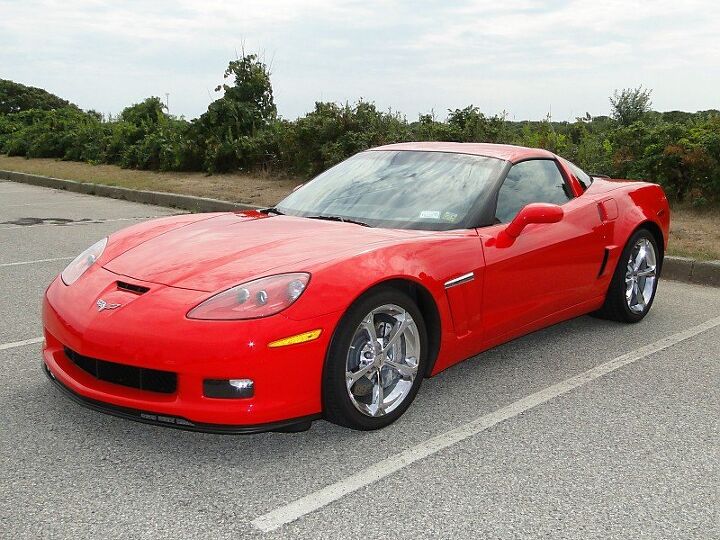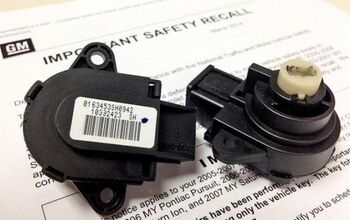General Motors Is Here To Save You From Yourself

Hat tip to my good friend Sam Strano, he of the approximately 400 SCCA Solo and ProSolo National Championships, who forwarded me a letter (click through the break). General Motors sent Sam, a 2007 Corvette Z06 owner, extremely specific instructions about what to do if he were ever to find himself stuck in his Corvette due to low battery voltage, complete with pictures and diagrams.
You might think that even Corvette owners would be able to figure out how to get out of their cars, especially the ones with removable roofs. But you’d be wrong.
Remember this poor guy? He basically cooked himself — and his poor dog, Leia — inside his own car this past summer.
Now, personally, there are lots of things to question about this: First of all, he was eating at Waffle House in the middle of the day. Secondly, his dog was named Leia. Thirdly, according to Sam (I’m not a C6 owner, so I had to ask), even without being able to lower the windows, he could have simply unlatched the roof and pushed it up.
“The windows do drop down slightly to get under the edge of the roof. But even when that doesn’t work you can open the doors no problem. So throwing the latches and pushing up on the roof it would have just come right out,” says Sam.
And then we have poor General Motors. Somebody dies in their car, and this time, it isn’t their fault. But they still have to send out tens of thousands of letters to C6 owners, explaining to them how to get out of their own cars. They just can’t win for losing.
So, if you have a Corvette, and you are stuck in your own car, never fear — help is on the way, in the form of this letter. Read it, comprehend it, and maybe even go practice.
Here’s the letter:

More by Mark "Bark M." Baruth
Latest Car Reviews
Read moreLatest Product Reviews
Read moreRecent Comments
- W Conrad I'm not afraid of them, but they aren't needed for everyone or everywhere. Long haul and highway driving sure, but in the city, nope.
- Jalop1991 In a manner similar to PHEV being the correct answer, I declare RPVs to be the correct answer here.We're doing it with certain aircraft; why not with cars on the ground, using hardware and tools like Telsa's "FSD" or GM's "SuperCruise" as the base?Take the local Uber driver out of the car, and put him in a professional centralized environment from where he drives me around. The system and the individual car can have awareness as well as gates, but he's responsible for the driving.Put the tech into my car, and let me buy it as needed. I need someone else to drive me home; hit the button and voila, I've hired a driver for the moment. I don't want to drive 11 hours to my vacation spot; hire the remote pilot for that. When I get there, I have my car and he's still at his normal location, piloting cars for other people.The system would allow for driver rest period, like what's required for truckers, so I might end up with multiple people driving me to the coast. I don't care. And they don't have to be physically with me, therefore they can be way cheaper.Charge taxi-type per-mile rates. For long drives, offer per-trip rates. Offer subscriptions, including miles/hours. Whatever.(And for grins, dress the remote pilots all as Johnnie.)Start this out with big rigs. Take the trucker away from the long haul driving, and let him be there for emergencies and the short haul parts of the trip.And in a manner similar to PHEVs being discredited, I fully expect to be razzed for this brilliant idea (not unlike how Alan Kay wasn't recognized until many many years later for his Dynabook vision).
- B-BodyBuick84 Not afraid of AV's as I highly doubt they will ever be %100 viable for our roads. Stop-and-go downtown city or rush hour highway traffic? I can see that, but otherwise there's simply too many variables. Bad weather conditions, faded road lines or markings, reflective surfaces with glare, etc. There's also the issue of cultural norms. About a decade ago there was actually an online test called 'The Morality Machine' one could do online where you were in control of an AV and choose what action to take when a crash was inevitable. I think something like 2.5 million people across the world participated? For example, do you hit and most likely kill the elderly couple strolling across the crosswalk or crash the vehicle into a cement barrier and almost certainly cause the death of the vehicle occupants? What if it's a parent and child? In N. America 98% of people choose to hit the elderly couple and save themselves while in Asia, the exact opposite happened where 98% choose to hit the parent and child. Why? Cultural differences. Asia puts a lot of emphasis on respecting their elderly while N. America has a culture of 'save/ protect the children'. Are these AV's going to respect that culture? Is a VW Jetta or Buick Envision AV going to have different programming depending on whether it's sold in Canada or Taiwan? how's that going to effect legislation and legal battles when a crash inevitibly does happen? These are the true barriers to mass AV adoption, and in the 10 years since that test came out, there has been zero answers or progress on this matter. So no, I'm not afraid of AV's simply because with the exception of a few specific situations, most avenues are going to prove to be a dead-end for automakers.
- Mike Bradley Autonomous cars were developed in Silicon Valley. For new products there, the standard business plan is to put a barely-functioning product on the market right away and wait for the early-adopter customers to find the flaws. That's exactly what's happened. Detroit's plan is pretty much the opposite, but Detroit isn't developing this product. That's why dealers, for instance, haven't been trained in the cars.
- Dartman https://apnews.com/article/artificial-intelligence-fighter-jets-air-force-6a1100c96a73ca9b7f41cbd6a2753fdaAutonomous/Ai is here now. The question is implementation and acceptance.



































Comments
Join the conversation
RIP Daddy. My Father and his dog were the ones who were trapped inside the 2007 Corvette and died 06/08/15. I was glad to see this letter has been sent to many owners in the US and Canada. If one life is saved by this letter, then they are helping create awareness of this terrible design. His death haunts me. He was a healthy well nourished male and died from hyperthermia, as stated in his autopsy. Found dead with owners manual out, but I'm sure passed out from heat before finding the tiny print on page 80 of 500 page manual about release while sweat pouring in his eyes. His life and Leia's was ended too soon. Some things said are very hurtful but I move on, ignoring the insensitivity of people. I think of the day before he died, he came by and was so proud of his car. What creeps me out, is the thought of what if he would have tossed my teen daughter or I the keys and said take it for a spin and one of us would have drove away, battery cable come loose and it died on us? I would have not known how to get out either. In a panic, would I have thought to get owner manual out? In 92 degree temps in Texas in June, the interior heat gets very hot fast. Its a hypothetical thought but could have happened. PS All he wanted was to own a Corvette, sad he only got less than 3 weeks. Not a fan of corvettes anymore.
I'm crazy enough to always read the whole damn manual, and it's getting harder as they get longer. 25 years ago you had to be lazy to not be able to do it. Now they're several times larger and rather intimidating. The more necessary they become, the less they'll get read.